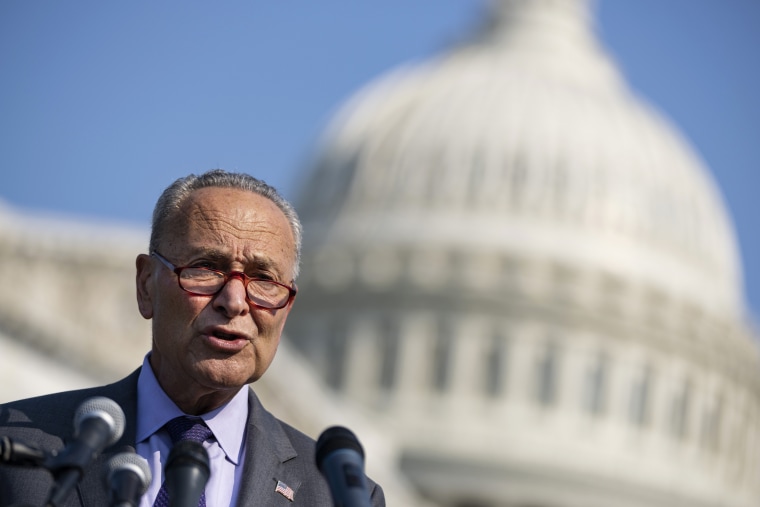WASHINGTON — The top two Democrats said they’re pushing forward with President Joe Biden’s sweeping safety net expansion, as House committees circulate legislative text with hearings scheduled Thursday to start advancing major sections of the bill.
“We're moving full speed ahead,” Senate Majority Leader Chuck Schumer told reporters on a call Wednesday.
The New York Democrat effectively cast aside calls by Sen. Joe Manchin, D-W.Va., for a “strategic pause” in the process of crafting the bill, as he voiced concerns about inflation and debt in a recent op-ed for the Wall Street Journal.
Schumer is navigating demands by Manchin, as well as Sen. Kyrsten Sinema, D-Ariz., to reduce the price tag that Democrats set at a maximum of $3.5 trillion in the budget resolution.
“There are some in my caucus who believe $3.5 trillion is too much; there are some in my caucus who believe it's too little,” Schumer said. “We're going to work very hard to have unity, because without unity, we're not going to get anything.”
Speaker Nancy Pelosi said Wednesday the House is moving forward at the $3.5 trillion level.
But she left open the possibility of a lower final price tag before the bill becomes law, while promising that “we will get the job done” with “a great bill” that honors Biden’s vision.
“We will have our negotiations,” Pelosi, D-Calif., said, when asked by NBC News if the House could pass a bill at a lower amount. “I don’t know what the number will be. We are marking at 3.5 [trillion]. ... We will pay for more than half, maybe all of the legislation.”
The remarks by Schumer and Pelosi point to a complicated balancing act, facing a broad range of opinions from centrist lawmakers skeptical of the price tag to progressives who believe $3.5 trillion should be the minimum. Democratic leaders are also juggling an aggressive timeline by seeking to ready the bill by Sept. 27 — the self-imposed House deadline to vote on the separate infrastructure bill — to ensure progressives will support the latter.
They are betting Manchin can ultimately be won over on the substance of the package. Lawmakers and committees are keeping options open in case the price tag needs to be cut: For instance, they’ve privately discussed setting some provisions to expire sooner.
Manchin has been somewhat vague in his demands. He has not specified what price tag he would support or what provisions of the emerging bill he wants to cut. His office did not have a comment when asked those questions Wednesday.
In June, he said on ABC's "This Week" that he wants to “make sure we pay for” the bill.
A source close to Manchin said he is a big proponent of targeting benefits on the basis of income and capping them so the money reaches people who need it the most — principles he believes are critical for Democrats' proposals on community college subsidies and on home-based care provisions for the disabled and elderly.
Manchin also has issues with the climate change proposals in the legislation, the source said.
As chairman of the Senate Energy and Natural Resources Committee, Manchin has major influence over the climate provisions. His committee was instructed to write legislation costing $198 billion for a clean electricity payment program, consumer rebates to weatherize and electrify homes, the creation of financing for domestic manufacturing of clean energy and auto supply chain technologies and climate research.
“He’s not opposed to the overall bill,” the source said. “He’s going to shape the bill to what he feels is closer to the needs. People shouldn’t read into it more than that.”
Senate Budget Chair Bernie Sanders, I-Vt., has said if the safety net package does not pass, the $550 billion bipartisan infrastructure package — which Manchin co-wrote — will fail as well.
He told reporters the $3.5 trillion level was too low.
“To my mind, this bill, that $3.5 trillion, is already the result of a major, major compromise,” Sanders said. “And at the very least, this bill should contain $3.5 trillion.”
Pelosi said slashing the cost would require making difficult policy choices.
“We have to talk about: What does it take? Where would you cut?” she asked. “Child care? Family medical leave paid for? Universal pre-K? Home health care?”
On Thursday, the House committees on ways and means and education and labor will hold hearings on major portions of the bill they released this week. That includes 12 weeks' paid family and medical leave for all workers; expanding Medicare to cover dental, vision and hearing benefits; universal pre-K for 3- and 4-year-olds; and two years' tuition-free community college.
Republicans are unified against the effort, leaving Democrats to pass the bill alone under narrow majorities. The package can bypass a Senate filibuster.
Senate Minority Leader Mitch McConnell, R-Ky., said Wednesday that he hopes Manchin and Sinema “will dig in their heels” against some of the tax increases Democrats are eyeing to finance the package. “It comes down to — in the Senate — to two people,” he said.
“Either one of them could kill the whole bill. I don't expect that to happen,” he said. “Either one of them could make dramatic changes in it — that could happen. Or either one of them could basically make a few cosmetic changes and throw in the towel.”



